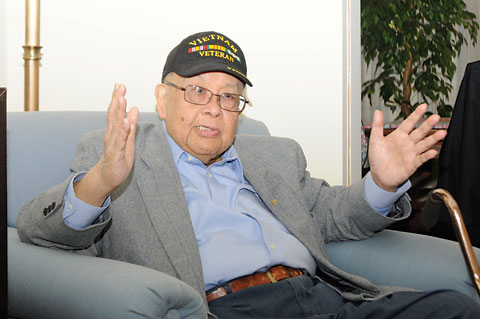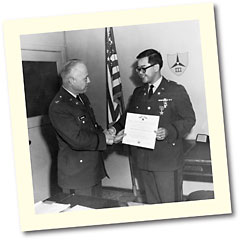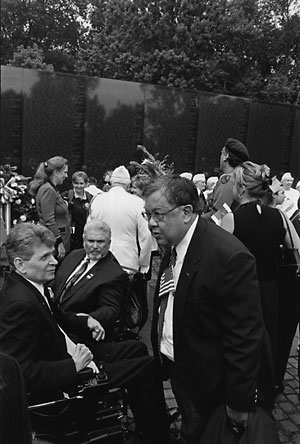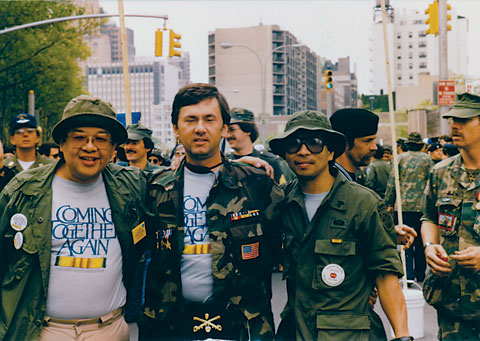 |
||||||||||||
|
May/June 2016
BY XANDE ANDERER
A third-generation Chinese American, Chow credits his parents—especially his mother, Ruby— with laying a foundation of determination and pride that has served him throughout a lifetime of service. Chow’s parents worked multiple jobs in Seattle restaurants in order to save enough money to eventually open their own restaurant: Ruby Chow’s. One of the first Chinese restaurants outside of Seattle’s Chinatown, Ruby Chow’s was once selected by Esquire magazine as one of the top twenty in America. Chow recalls a pivotal moment when he was eleven, working as a busboy. A couple had just finished their meal, and they were in the process of calculating their bill. The woman suggested a ten-cent tip, reasoning aloud the staff were “just Chinese, after all.” Confused about what the customer meant, Chow turned to his mother for an explanation. “She told us this was the reason we need to always work twice as hard and twice as much—because we are Chinese. We’d always be proving ourselves to the next person.” “That’s why I’ve worked so hard throughout my career,” he reflects. “It’s that concern I have inside me that has propelled me to all my past accomplishments.” In 1956, with the full support of his parents, seventeen-year-old Ed Chow enlisted in the Army Reserves while in high school and went on active duty for six months before starting college.
Reflecting on his retirement as Maryland State Secretary of Veterans Affairs last January, Chow points out how his mother’s twice-as-long/twice-as-hard philosophy has served him so well. His last boss, former Gov. Martin O’Malley, kept a binder of spreadsheets tracking the attendance of his cabinet members at outreach events. Chow, by far the most active, topped those graphs every single year. Chow was appointed Maryland Secretary of Veterans Affairs in 2009—just a year before O’Malley’s bid for reelection as governor. “He said to me, ‘You’re in charge, Ed. Just do it.’ ” Four secretaries would be dismissed in the months leading up to the election. “He held his secretaries accountable,” explains Chow. “I loved that because government needs to be built on accountability. “We are beholden to the taxpayers. One of the things I am most proud of is saving the taxpayers $5 million as Maryland State Secretary of Veterans Affairs, $1.1 million when I was a cabinet official in Washington State, and $1.5 million as a city administrator,” Chow boasts. “And we’re not talking rocket science here. It’s simply asking questions—constantly challenging the way the business of government is done. I think that’s the doctrine by which people who manage should live.”
This doesn’t mean the “Chow Doctrine” was fully formed. “I always say I had four colonels and a lot of good sergeants who mentored and guided me,” he muses. “We were all so young. And still in the process of growing up.” After serving as a reservist from 1956-60, Chow was commissioned in the Army in 1962. After officer training, he shipped off for Germany, where he was ecstatic to learn he’d be almost one hundred miles from battalion headquarters. “Even as a dumb second lieutenant, I knew the farther away you were from the colonel, the better off you’d be.” He had barely begun to relish that thought when the adjutant called to say he’d been reassigned to the 590th Transportation Company—a mere two buildings away from headquarters. “The colonel saw something in me,” he says. “The company I was assigned to hadn’t passed an AGI [Annual General Inspection] in three years, or a CMMI [Command Maintenance and Material Inspection] in five,” Chow recalls. “They had the highest number of Article 15s and the highest number of courts martial in Germany. Morale was lower than a whale’s belly.” Chow attacked the issues with typical aplomb. “I got in there and identified a couple of crack sergeants and we made a list of the deficiencies and started chipping away.” Within a year the 590th had passed both inspections on the first try. Of course, no good deed goes unrewarded. Chow was called up to brigade and assigned to apply his methods to clean up the operations of the area’s NCO club and three enlisted clubs. With the help of some good sergeants, they made the clubs accountable and profitable. “In case you were beginning to think I was smart, I actually volunteered for Vietnam next.”
Initially Chow was assigned to a “cushy desk job in Saigon,” but—in what seems a recurring theme—his orders changed and the newly minted Capt. Chow was sent up to HQ, 504th Field Depot, where he replaced a lieutenant colonel with responsibilities extending throughout II Corps. He attacked his duties there with the same spirit as in Germany, earning a Bronze Star in the process, despite sometimes employing—shall we say—unorthodox methods to bypass military logjams. Army policy changed once again, and personnel whose service had been extended involuntarily were offered an opportunity to apply for immediate release from active duty. Chow, with six months remaining in his tour, declined. “I didn’t want anyone to think I was a coward or that I was jumping at the first opportunity to leave,” he says. “Besides, I really believed in what we were doing over there. Remember, this was early—1966. Most everyone in the Army did.”
Returning home, Chow earned an M.P.A from the University of Puget Sound and worked in finance for a few years before receiving a fateful call from his former boss in Vietnam, Col. Nathaniel Gage, who recommended him to help clean up and reorganize the Washington State Department of Emergency Services in 1978. He was hired as Executive Assistant, then promoted to Director in December 1979—five short months before Mount St. Helens erupted, killing fifty-seven, reducing hundreds of square miles to wasteland, and causing more than $1 billion in damage. Here was yet another uphill battle to which the Chow Doctrine could be applied.
Later, while running his own business—a consulting firm—and working as a manufacturer’s representative for several years, Chow became president of the VVA Washington State Council. He did a stint at the Seattle Regional Office of the Department of Veterans Affairs before becoming the City Administrator for the city of Kent, Washington. He was then appointed by the Clinton administration as Deputy Assistant Secretary in the VA’s Office of Policy and Planning before being elected VVA National Vice President for the first of two terms in 2001 and President of the Maryland State Council in 2006.
With much success comes much satisfaction. And it’s no surprise that Ed Chow looks back on his years of service with pride. Not only in himself, but in the crack staffs he assembled. “The best staff people are those who don’t just bring a dilemma to your attention, but bring possible solutions to that problem already in mind. That’s key,” he says. “When I took over as Maryland State Secretary of Veterans Affairs, the department was processing about 50,000 contacts per year. When I left we were processing 200,000—all with the same size staff.” “Notice I said the same size staff, not the same staff,” he grins. “When you are an officer, you lead, you manage, and you look out for your people. Too many people get into positions of power and they walk around as if they’re God’s gift to the world. They don’t think much about doing anything for anyone but themselves.” That’s not part of the Chow Doctrine.
|
||||||||||||
|
|
||||||||||||
|
|
||||||||||||
8719 Colesville Road, Suite 100, Silver Spring. MD 20910 | www.vva.org | contact us |
||||||||||||
























 Having completed his service commitment, Chow assumed he’d be headed stateside and eventually home. Instead, the Army levied the brigade for fifty junior officers and exercised its option to extend his enlistment, planning to send him for more training, then to Vietnam. Instead, Chow said he’d rather skip the advanced training and go straight to Vietnam.
Having completed his service commitment, Chow assumed he’d be headed stateside and eventually home. Instead, the Army levied the brigade for fifty junior officers and exercised its option to extend his enlistment, planning to send him for more training, then to Vietnam. Instead, Chow said he’d rather skip the advanced training and go straight to Vietnam.